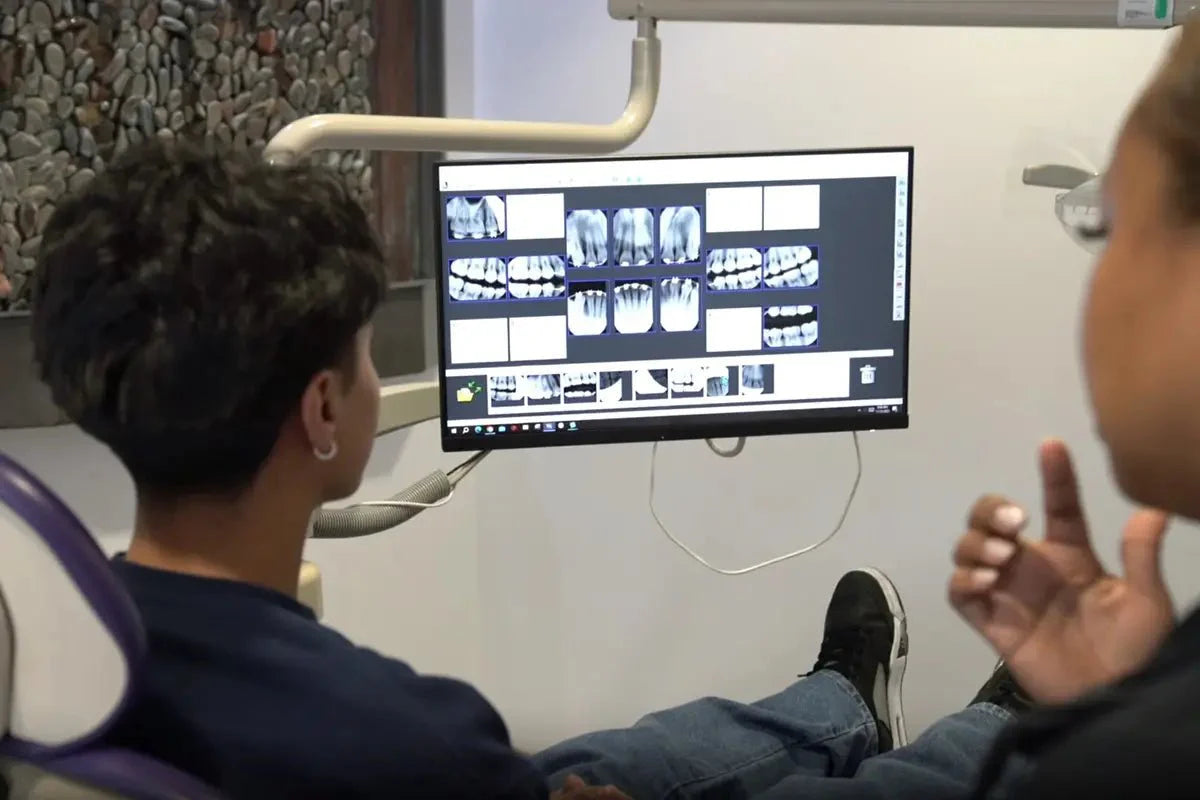Canker Sores After Tooth Extraction: Causes and Remedies
Dental extractions are almost painless and don’t cause serious complications. Getting a canker sore after a tooth extraction, though, is quite common.
These sores can be painful, and can make you more uncomfortable after dental work. Why and how do canker sores occur? We’ll discuss everything in this article.
Plus, we’ll give you a few tips on how to manage pain and other related symptoms.

Post-Tooth Extraction Symptoms of Canker Sores
- Small, Round, or Oval Ulcers - canker sores appear as small, round, or oval ulcers inside the mouth. They are often white or yellow in the center with a red, inflamed border.
- Pain and Discomfort - Canker sores can be painful, especially when eating, drinking, or talking. Before a sore fully develops, you may feel a burning or tingling sensation in the affected area.
- Swelling - the tissue around the canker sore may become swollen, causing additional discomfort. This can make it uncomfortable to chew, eat certain foods, or speak.
There are two types of post-tooth extraction canker sores. Minor canker sores are the most common. Minor sores are usually small, round, or oval-shaped. It heals without scarring in one to two weeks. Major canker sores on the other hand are larger and deeper than minor canker sores. This can be extremely painful and may take up to six weeks to heal.
What causes Canker Sores after Tooth Extraction?
After tooth extraction, canker sores usually appear as a result of injury or irritation to the sensitive oral tissues. Canker sores can also occur as a result of other factors, such as changes in oral bacteria, irritation from dental tools, or stress from the process. According to a study some deficiencies, such a shortage in iron or vitamin B, or damage to the oral mucosa may potentially be a trigger.
However, not everyone develops canker sores after a tooth extraction. Certain people might be particularly vulnerable because of things like underlying medical issues, a history of canker sores, or pre-existing oral sensitivity. For others, the mouth heals without complications, and no sores form. Below is a brief explanation of how canker sores develop from these factors:
- Trauma to the Mouth
- Bacteria and Infection
- Stress
- Nutritional Deficiencies
- Irritation from Dental Tools
How to Treat Canker Sores After Tooth Extraction
Canker sores usually disappear on their own within one to two weeks. They are typically minor issues that are resolved without the need for medical intervention. However, in some cases, the pain and discomfort caused by these sores can be quite unbearable. Fortunately, it can be effectively managed with simple home remedies or over-the-counter treatments.
- Salt Water Rinse – warm salt water can cleanse the area and promote healing. Mix 1/2 teaspoon of salt in 8 ounces of warm water and swish the solution around your mouth for 30 seconds, 2-3 times a day.
- Ice - applying a cold compress or sucking on ice chips can help numb the affected area and reduce swelling and pain.
- Drinking plenty of water – drinking plenty of water can keep your mouth moist. This will prevent dry mouth that worsens canker sores.
- Hydrogen peroxide - hydrogen peroxide is an antiseptic that works by removing bacteria to promote the healing of canker sores while the mouth heals. Using a cotton pad, apply a mixture of equal parts peroxide and water on the sores. Avoid swallowing and look for 3% hydrogen peroxide.
- Medicated mouthwash - Dexamethasone-containing mouthwashes are excellent for treating multiple sores. A cortisone-like medication called dexamethasone, on the other hand, is used to relieve inflammation. Talk with your dentist about prescriptions for mouthwashes containing antibiotics or corticosteroids.
There are also certain situations where you should seek help from a professional. If you experience any of the following, it's important to consult your dentist or doctor if:
- Canker sores accompany high fever
- It becomes severe or unbearable despite using over-the-counter treatments and home remedies
- You frequently experience multiple canker sores that are particularly large or persistent
- It causes such significant discomfort that you find it extremely difficult to eat or drink
Preventing Canker Sores After Tooth-Extraction
To prevent and reduce the chance of canker sores from developing, especially after a tooth extraction, it’s important to follow certain measures:
- A balanced diet rich in vitamins and minerals, particularly B vitamins, iron, and folate, supports oral health and can reduce the risk of canker sores.
- Stress can weaken the immune system and trigger canker sores. Make sure to sleep for eight hours or more during the recovery period and avoid physical activities.
- Smoking and consuming alcohol can irritate the oral mucosa. Avoid these substances to maintain a healthier oral environment and reduce the risk of sores forming.
- When cankers sores appear after your tooth extraction, brush and floss gently around the extraction site to avoid irritating the soft tissues further.
See a Dentist in Culver City
If you show signs of a major canker sore that has progressed or failed to improve within two weeks, it’s important to see your dentist in Culver City right away.
For a worry-free recovery after tooth extraction and to address any lingering dental concerns, schedule an appointment with our dentist at United Dental Care in Culver City. We’ll provide the best course of treatment to get you back on the road to recovery.




 By:
By: 

